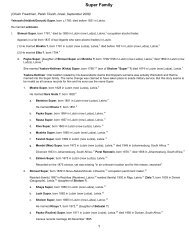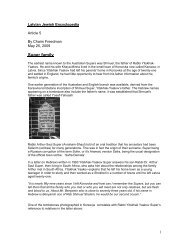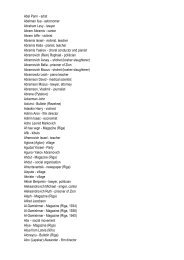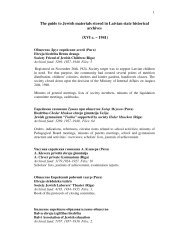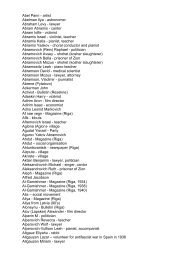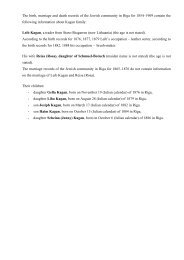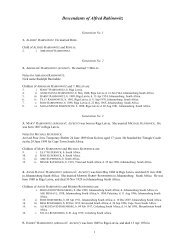Small Riga Ghetto
Small Riga Ghetto
Small Riga Ghetto
Create successful ePaper yourself
Turn your PDF publications into a flip-book with our unique Google optimized e-Paper software.
250<br />
Godes and Schalit. Their health condition was especially bad. In a quiet corner<br />
of this barrack one could also find the prominent <strong>Riga</strong> painter Rudi. He generally<br />
worked on drawings ordered by people who paid for them in bread.<br />
Because we almost never had a real day of rest on Sundays, we waited for<br />
the next morning and our factory work with impatience.<br />
The day began at four in the morning. Within a few minutes we had to be on<br />
our feet and make our beds army-style. For a long time I slept next to my<br />
comrade Joffe to warm myself, but he needed more space, so he found himself<br />
a better sleeping place on the second level. Now came the order: "Get coffee!"<br />
A different group was appointed every week to do this job. The coffee had to<br />
be fetched from the kitchen of the women's camp, where only women worked,<br />
including a couple of Jewish women. One day this job was assigned to me. I<br />
still remember exactly: it was the morning of 1 January 1945. The personnel,<br />
including the guards, were still in a New Year's Eve mood. I immediately took<br />
advantage of this unique opportunity, and out of a pail of leavings from the<br />
previous evening's holiday feast I took as much goose goulash as I could stash<br />
away. Because I was totally unprepared for this "find", I had to put everything<br />
I managed to grab into my pockets and my cap. I reached our barrack successfully<br />
with this precious booty. I gave my comrades some of it, ate my fill, and<br />
still had some left over to trade with. Of course I had customers from the best<br />
social circles for these goods, so I had enough food for myself that whole<br />
week.<br />
Once a similar coincidence occurred in the factory, and it helped me a great<br />
deal. A foreman from another department, who assumed I was a doctor, asked<br />
me to translate a letter for him. I took the letter with me to the camp and asked<br />
a friend of mine who was a genuine doctor to translate it. It was a letter in<br />
German containing Latin medical terms. The foreman wanted to receive the<br />
treatment described in the letter so that he would be exempted from military<br />
service. He was very satisfied with my performance and told me later that the<br />
letter had saved him. To reward me, he gave me between five and ten potatoes<br />
a day for several weeks. Cooking them in the factory was by no means easy,<br />
but we found a way to do even this. Cooking potatoes in the camp was also<br />
very difficult. There was only a single small iron stove in the washroom. To<br />
get permission to use it, we had to pay a percentage of our potatoes to the<br />
room elder there. The stolen potato peelings were also cooked, and we made a<br />
"tsimmes”, dish of carrots. Every one of us suffered from stomach aches.<br />
One Sunday I was supposed to fetch our lunch together with a group of other<br />
men. We were standing next to the kitchen and waiting for the pails. At this



